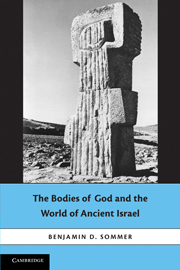Book contents
- Frontmatter
- Contents
- Preface
- Acknowledgments
- Introduction: God's Body and the Bible's Interpreters
- 1 Fluidity of Divine Embodiment and Selfhood: Mesopotamia and Canaan
- 2 The Fluidity Model in Ancient Israel
- 3 The Rejection of the Fluidity Model in Ancient Israel
- 4 God's Bodies and Sacred Space (1): Tent, Ark, and Temple
- 5 God's Bodies and Sacred Space (2): Difficult Beginnings
- 6 The Perception of Divinity in Biblical Tradition: Implications and Afterlife
- Appendix: Monotheism and Polytheism in Ancient Israel
- Notes
- List of Abbreviations
- Bibliography
- Scriptural Index
- Index of Rabbinic Citations
- Subject Index
6 - The Perception of Divinity in Biblical Tradition: Implications and Afterlife
Published online by Cambridge University Press: 15 September 2009
- Frontmatter
- Contents
- Preface
- Acknowledgments
- Introduction: God's Body and the Bible's Interpreters
- 1 Fluidity of Divine Embodiment and Selfhood: Mesopotamia and Canaan
- 2 The Fluidity Model in Ancient Israel
- 3 The Rejection of the Fluidity Model in Ancient Israel
- 4 God's Bodies and Sacred Space (1): Tent, Ark, and Temple
- 5 God's Bodies and Sacred Space (2): Difficult Beginnings
- 6 The Perception of Divinity in Biblical Tradition: Implications and Afterlife
- Appendix: Monotheism and Polytheism in Ancient Israel
- Notes
- List of Abbreviations
- Bibliography
- Scriptural Index
- Index of Rabbinic Citations
- Subject Index
Summary
I attempted to uncover in the preceding chapters two sides of a theological debate that took place in ancient Israel. Some biblical authors, embracing a theological intuition common throughout the ancient Near East, maintained that God differs radically from human beings because God's body and self are completely unbounded. For these thinkers, who include the J and E authors of the Pentateuch, God has many bodies, and God's person finds expression in more than one self, even as the underlying unity of the being called Yhwh endures. Other biblical authors, including those of the priestly and deuteronomic schools, completely rejected this conception. Putting greater emphasis on God's unity, they insisted that God has only one body and one self.
It was the latter group who shaped the Hebrew Bible as we know it. The priestly authors or their descendants were probably the final editors of the Pentateuch; the superstructure of the Books of Genesis, Exodus, Leviticus, and Numbers is identical to the basic framework of the priestly document. Thus it is no coincidence that the priestly ritual code that comprises the Book of Leviticus is located in the center of the Pentateuch or that the priestly account of the dedication of the tabernacle in Leviticus 8–10 occurs at the exact midpoint of the Five Books of Moses. The priestly shaping of the Pentateuch's final form has a profound influence on the way one reads this work as a whole.
- Type
- Chapter
- Information
- The Bodies of God and the World of Ancient Israel , pp. 124 - 144Publisher: Cambridge University PressPrint publication year: 2009



